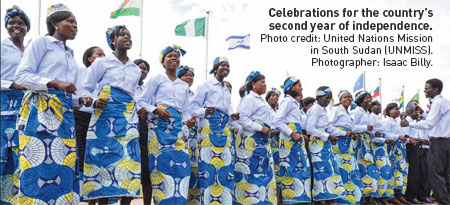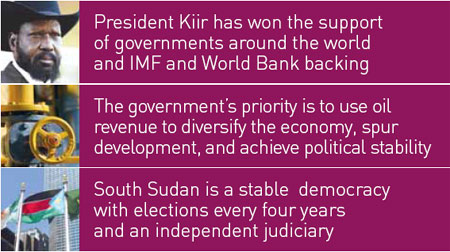South Sudan Building the Future

The world's newest nation is open for business
In the two years since it achieved independence, south Sudan has become a magnet for investors from around the world, drawn not just by the huge potential of its oil industry, but also by the wide range of opportunities to be found in sectors such as finance, agriculture, services, and infrastructure.
Juba, the capital, has been transformed, with new roads, buildings, restaurants, banks, hotels, and air-conditioned offices appearing each month. Delegations of contractors and businessmen make their way back and forth through the newly refurbished airport for meetings with government ministers and bank officials. There is a buzz of excitement as the world's newest country charts its way to the future.
South Sudan's government has made huge strides in creating a flexible, enabling environment for business, passing a raft of laws to facilitate new ventures, as well as offering tax incentives and import duty exemptions.
"Among the main tasks the government is addressing is building infrastructure so that we can provide the right conditions for investors. so we are looking at our road networks, telecommunications, water, and electricity, among others," says Sitona Abdalla Osman, the country's ambassador to Germany, and its main representative in Europe.
South Sudan has also won the support of governments around the world: Kenya, Uganda, South Africa, the US, China, India, the UAE, as well as the World Bank, have all provided crucial financial backing.
Chinese companies have been working on infrastructure development in South Sudan, while Beijing has pledged a grant of $43 million to finance improvements in the mining sector. Talks are underway on a development loan of up to $2 billion.
"The government has welcomed investors to help develop an economy ravaged by the independence war and wean it off its dependence on oil, which accounts for 98% of government revenue," she says.
South Sudan has reserves of around 3.5 billion barrels, Africa's fourth largest, and is currently producing around 180,000 barrels a day. The government's priority is to use oil revenue to diversify the economy, jump-start socioeconomic development and achieve long-term political stability.
"Diversification is the most important task we face, and the best way to achieve this is through agriculture, our strongest sector," says Ms Osman.
More than 90% of South Sudan's land is arable, and it could easily become the breadbasket of Africa and the Middle East. A land policy bill that will facilitate largescale agriculture should be finalised by the end of the year.
But aside from big investment areas like agriculture, infrastructure, and oil, the South Sudanese economy is also attracting entrepreneurs and companies who see the importance of gaining an early foothold in this booming economy, where just about everything still has to be imported.
The government is also pushing initiatives such as one to revamp textile, cement and food factories shuttered during the civil war, some of which date back to British colonial rule, to make more jobs for South Sudanese.
The country also has vast mineral wealth that has barely been touched. Geological surveys conducted in the 1970s and 1980s show that South Sudan might have rich deposits of gold, copper and uranium. But since those surveys were conducted, South Sudan's mineral resources have remained unexploited.
South Sudan's Parliament passed a mining law in March that allows international firms to receive five-year exploration permits. The first step toward getting a permit is a geological survey, which would indicate where a company should dig.
Overall, South Sudan's business leaders are optimistic and eager to take up the challenge of running their own economy. At the same time, they are learning to balance their expectations: the country is just two years old, and is still preparing legislation to provide further guarantees to investors. But the United Nations, the IMF, and the World Bank agree that the country has made tremendous progress since July 2011 to build a democratic, free market economy.
"We can say that we are the fastest growing country in the world now - working on housing, roads, telecommunication, energy and many more. Our journey has started well, and we are tackling our challenges," says Ms Osman.


(China Daily European Weekly 12/20/2013 page16)
Today's Top News
- Chinese landmark trade corridor handles over 5m TEUs
- China holds first national civil service exam since raising eligibility age cap
- Xi's article on CPC self-reform to be published
- Xi stresses improving long-term mechanisms for cyberspace governance
- Experts share ideas on advancing human rights
- Japan PM's remarks on Taiwan send severely wrong signal






























